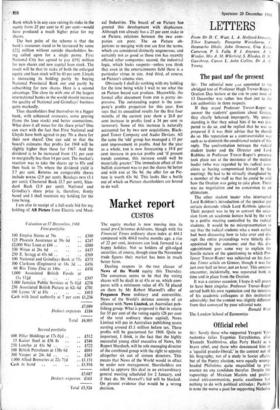The past and the present
LETTERS
From Dr D. C. Watt, L. A. Holford-Strevens, Tibor Szamuely, Peregrine Worsthorne, F. Iheanacho Okole, John Ormowe, Una Keith Cameron, P. S. Falla. B J. Angrave. A. S. Winder, Mrs A. M. Whitfield, S. Rhodes, H. W. Gawthrop, Canon L. John Collins, Dr A. R. Young.
Sir : The editorial note you appended to the abridged text of Professor Hugh Trevor-Roper's Oration Day lecture at the LSE in your issue of 13 December was rather less than just to the LSE authorities in three respects.
If they urged Professor Trevor-Roper to answer the students' questions about Greece, they clearly behaved improperly.. My under- standing is that they asked him if he was pre- pared to do so, and he replied that • he was so prepared if it was their advice that he should do so. His reputation as a controversialist was such as to diminish the conditional nature of this reply. The confrontation between the radical student leader and the •Director and Lord Robbins in Professor Trevor-Roper's presence took place not at the insistence of the student leader (who was regarded by his radical asso- ciates as having compromised himself by the meeting). He had to be virtually shanghaied by a member of the staff so that he fould be told how the Oration was going to take place. There was no negotiation and no concession to an ultimatum.
The other student leader who interrupted Lord Robbins's introduction of the speaker put certain demands which Lord Robbins ignored. Their purport was to try to convert the occa- sion from an academic lecture held by the LSE to a public meeting controlled by the radical students. It would be no misrepresentation to say that the radical students who a week earlier had been discussing how to take over and dis- rupt the entire proceedings were bitterly dis- appointed by the outcome; and that this dis- appointment goes some way to explain the hostile nature of the questioning to which Pro- fessor Trevor-Roper was subjected on his Sun- day Times article on Greece; though it was for just over half an hour, not an hour. This anxious encounter, incidentally, was separated both in time and in place from the Oration.
It was a curious occasion; I hope it_ will prove to have been singular. Professor Trevor-Roper served both his own reputation and the interests of his academic colleagues at this institution admirably; but the context was slightly different from that conveyed by your editorial note.


































 Previous page
Previous page